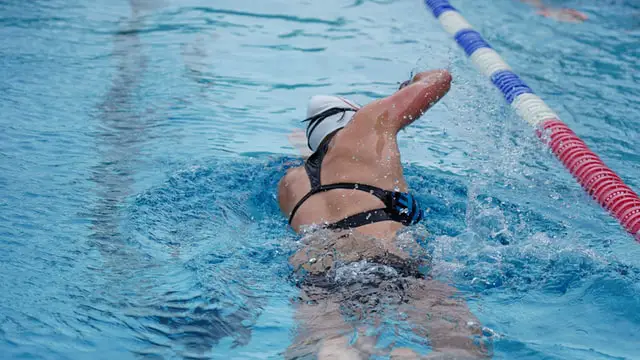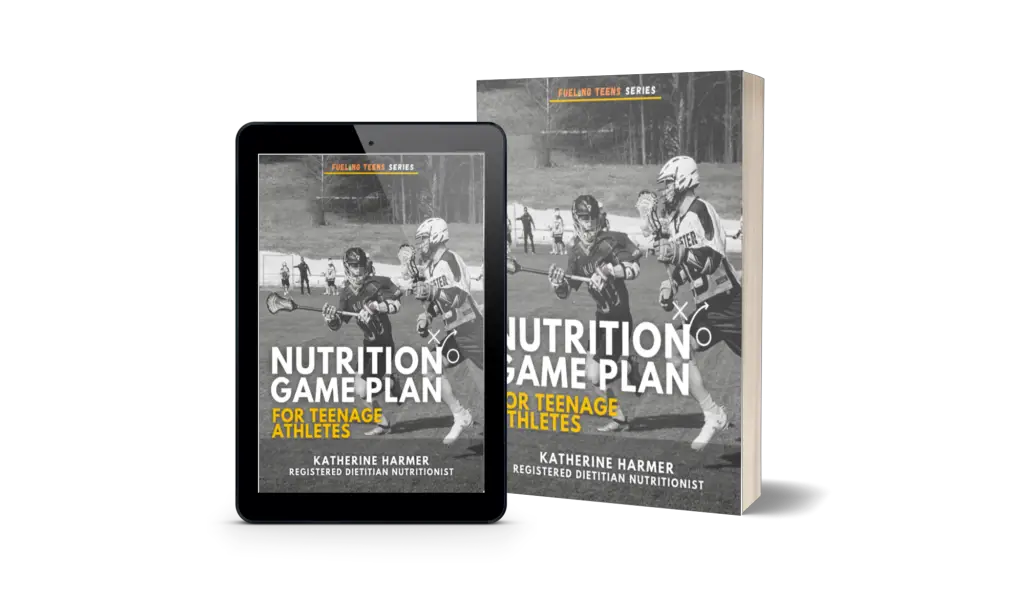Swimmers exert tons of energy in practices and meets and must follow an eating pattern that provides the calories and nutrients they need to perform at their best. It is challenging to meet an athlete’s food needs without eating a solid breakfast. Athletes will feel their best when they are eating regularly throughout the day, starting first thing in the morning!
Some of the best breakfasts for swimmers include scrambled eggs and toast, bagel with nut butter and banana slices, whole wheat cereal and milk, veggie omelet, Greek yogurt with granola and berries, a homemade fruit and veggie smoothie, or a protein bar with a piece of fruit. The best breakfast for a swimmer is one that gives your body energy and helps you feel and perform at your best which includes complex carbohydrates, lean proteins, and healthy fats. Depending on your schedule and when you swim, your breakfast might look a little bit different day-to-day. As you come to understand why eating breakfast is so important and how to fuel for exercise, it will become very easy for you to choose the best breakfast for your body.
Read on for more information about why breakfast is important, important nutrients that swimmers should include, nutrition tips for meet days, and some breakfast ideas for athletes!

Why is Breakfast Important for Swimmers?
Breakfast is important for everyone, not just swimmers. After being asleep and not eating for quite a while, your body needs fuel before it can really perform its best. Breakfast is the first fueling opportunity of the day and is therefore an essential one!
Breakfast is especially important for swimmers because they have higher energy needs than the average person and they are pushing their body harder than the average person. Skipping out on breakfast is skipping out on an opportunity to give your body the nutrients it needs to get stronger, recover quicker, and perform better.
Studies have shown time and time again that eating breakfast is linked to so many positive outcomes including:
- Improved concentration and focus
- Improved blood sugar stability
- Maintaining a healthy weight
- Improved energy levels
- Regulated appetite levels throughout the day
- Improved test scores
Should Swimmers Eat Breakfast Before an Early Practice or Meet?
Lots of athletes know that breakfast is important, but what if you have to wake up super early to go to practice, or you have a swim meet first thing in the morning? Should you still eat breakfast then? What if it makes you feel sick to eat in the morning or what if you feel nauseous if you eat before you swim?
These are all valid questions! Eating large amounts of certain things can definitely cause issues when you are swimming, but focusing on the specific foods that your body uses as a quick energy source will help provide your body with fuel without making you feel sick or sluggish.
The closer you get to exercise, the more heavily you should focus on eating carbohydrates and simple sugars. Protein, fat, and fiber actually slow down digestion and eating too much might make you feel sluggish or sick during exercise because your system is still trying to digest your food. Simple sugars are digested quickly when consumed by themselves and are ready to be used as an energy source during your swim.
So the answer is yes, swimmers should always eat something in the morning before they swim, but it doesn’t have to be a typical balanced breakfast. I encourage athletes to experiment with different foods and eating routines to find what works best for them and helps them feel their best. Finding the balance between eating enough of the right foods to feel energized, but not overdoing it to a point where you feel sick or sluggish can take some time to figure out, so make sure to give yourself plenty of time to experiment before competitions start!
Important Nutrients for Swimmers
There are many important nutrients for swimmers to be consuming on a daily basis. If you aren’t eating enough or aren’t eating the right foods at the right times, you might struggle to build muscle, get faster, feel energized, recover quickly, reduce soreness, and prevent injuries. Here are the main nutrients that swimmers should make sure to include every single day!
Carbohydrates for Swimmers
Carbs break down into sugars are your body’s favorite source of energy, especially for exercise. Swimmers expend more energy than the average person and will need more carbohydrates. Carbs should be consumed every time you eat. Yep, that includes meals and snacks.
Eating carbohydrates regularly throughout the day will give you a consistent source of energy. You might need to eat even more carbohydrates close to and even during exercise since your body is working so hard at that time. Athletes typically need at least 50% of their daily calories coming from carbohydrate sources.
Carbohydrates are found in lots of foods like fruit (Including fresh, frozen, canned and dried fruit, and fruit juice), grains (including bread, pretzels, crackers, pasta, tortillas, rice, etc.) some dairy (like milk and yogurt), and vegetables (especially starchy vegetables like corn, peas, and potatoes). Carbs are also found in sports drinks and fruit snacks, and candies.
Protein for Swimmers
So much of your body is made up of protein and your body is constantly having to take care of itself and make sure everything is healthy and strong. Protein is essential to that maintenance. Athletes are pushing their body extremely hard and they need protein to recover and help maintain and build muscle.
Protein is found in foods like meat, poultry, fish, milk, greek yogurt, cheese, nuts, seeds, beans and legumes, tofu, edamame, and soy milk. Other than right before exercise and during exercise, protein should also be consumed every time you eat- meals and snacks included!
See also:
- The Best Protein Snacks for Teenagers
- The 25 BEST Pre-Workout Meals and Snacks For a Teenage Athlete
- The BEST Post-Workout Snacks for Teenagers – Dietitian Recommended!
Fat for Swimmers
Many people have a fear of fats because they don’t want to store extra fat in their body. However, fat is an essential nutrient for everyone that can help decrease inflammation in the body, increase vitamin absorption, regulate hormones, and help you feel satisfied when eating a meal.
Some fats are better than others though. I encourage athletes to include healthy fats that are higher in unsaturated fats and omega-3’s and low in saturated fats. Trans fats, even in small amounts (not listed on the nutrition facts label) are dangerous to the body so I encourage people to look for hydrogenated and partially hydrogenated oils on the ingredient list and avoid those foods if possible!
Healthy fats that swimmers can look to include in their diet are avocados, olive oil, salmon and other fatty fish, nuts, nut butters, and seeds.
Vitamins and Minerals for Swimmers
I won’t go through all the things that vitamins and minerals do for the body because there are SO MANY. They are literally involved in every process and reaction that is occurring in your body- constantly. Once again, athletes put a lot of stress on their body and need plenty of vitamins and minerals to help deal with that stress.
Vitamins and minerals are found in a wide variety of foods, like fruits, vegetables, whole grains, healthy fats, dairy, and protein. The best way to ensure your body gets enough vitamins and minerals is to eat a variety of foods from all of the food groups, especially focusing on getting 5 or more servings of fruits and vegetables.
It is best to get your vitamins and minerals from foods, but there may be some situations where a supplement might be helpful. Check with your doctor before using any supplements and work with a dietitian to ensure that your body is getting all of the nutrients that it needs in the appropriate amounts.
Fluids for Swimmers
Swimmers and other athletes have higher fluid needs than the average person. However, since you are in the water, you might forget that you are still sweating and losing a lot of fluid that way. Work with a dietitian to figure out your specific water needs based on your individual body and physical activity level.
Things like milk, juice, sports drinks, soups, and many fruits and vegetables actually have a high water content and can also help you reach your hydration needs for the day. In fact, during a long swim practice or a meet, a sports drink might be a good option to help keep you hydrated as well as provide some extra carbohydrates to keep you energized and electrolytes to replace the ones you lose in sweat.
Need some more help with your swimming nutrition? Be sure to check out my Teen Athlete Meal Plan and Nutrition Tips.
Tips for Meet Days
Meet days might throw your schedule off a little bit, so it is important to make a plan for meeting all of your nutrition needs.
Here are some of my best tips for swimmers on competition days:
- Don’t try out new nutrition routines on the day of competition. Stick to what you know works for your body. If you want to try something new, try it on a practice day or during the off-season.
- Start sipping on fluids early so you don’t have to consume a whole lot right before your competition.
- Get plenty of sleep and manage stress and anxiety. I know this one isn’t technically nutrition-related, but it is such a huge part of preparing for sports competition. As you become more in tune with your body, you will know what it needs to feel strong, calm, and rested.
- Keep snacks with you at all times. You never know when your schedule will get thrown off, so have food available to fuel even if your original plan gets messed up.
- Eat something after your meet. If you can have a solid meal within an hour of your exercise that is great, but if it takes a while to get to a full balanced meal, at least have a snack with protein and carbohydrates to hold you over. Eating something within an hour of exercise is an important part of recovery nutrition!
Breakfast Ideas for Swimmers
These are some balanced breakfast ideas that include carbohydrates, protein, and fat. You may need to adjust what you are eating depending on when you swim, but this can still give you some good ideas.
- Scrambled eggs, orange juice, bagel with peanut butter
- Cereal and milk with a couple hard boiled eggs
- Omelet with veggies and cheese, toast and berries
- Greek yogurt with granola and berries
- English muffin sandwich with egg, cheese, and deli meat, with a fruit smoothie
- A smoothie made with fruit, nut butter, and greek yogurt
- Protein bar, a banana, and some crackers
- Granola bar, greek yogurt, and an apple
Summary
If you are wondering whether or not you should eat breakfast- the answer is always yes! Unfortunately, eating in the morning is hard for some people. If that is the case for you, start with liquids like smoothies or simple carbohydrates before a workout.
Your body will get used to eating in the morning as it becomes a habit, and you will see so many benefits come from starting your day off with a good meal!
Resources
Ellis E. 5 Reasons Your Teen Needs Breakfast. Eatright.org. Published September 24, 2021.
Fueling Teens is a participant in the Amazon Services LLC Associates Program, an affiliate advertising program designed to provide a means for sites to earn advertising fees by advertising and linking to Amazon.com. We also participate in other affiliate programs which compensate us for referring traffic.

